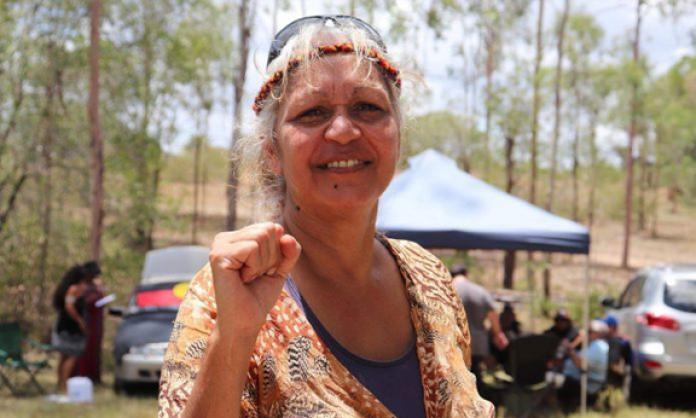Since early February, Indigenous activists and supporters have been camping at Deebing Creek, Ipswich, in protest at a developer’s plan to build flats on a former mission and heritage site. Red Flag spoke to Yuggera women Aunty Faye and Karen Coghill about Deebing Creek’s history and the current struggle.
At the entrance to Deebing Creek, signs say “Yuggera-Ugarapul land”. If it weren’t for Indigenous activists and supporters, there would be no recognition of what the rolling hills and bushland used to be. For more than 50 years, the Salvation Army operated a mission at Deebing Creek. Children and adults were taken from across Queensland to the Ipswich site. Aunty Faye, now 73, was among them.
“There are 14 kids in my family, and I was the second eldest. We lived here in one of the old mission houses”, she says, sitting on a fold-up chair in the protest camp. “This place is very sacred to us. There are unmarked graves. There were places we weren’t allowed to go by our mum, but she never told us why. And as we’re getting older, now we know. Next time, I’ll take you to our old cemetery down across the road. There’s just one headstone. They say she was a teacher, and she was shot and all the little ones were massacred.
“When I was 14, I was taken to Nudgee orphanage. I had housemaid knees by the time I was 16 because of scrubbing floors. I never got paid. They’d buy me a ticket to come home, and that was it. It used to take nearly all day to get from Nudgee to where we lived. I didn’t want to be there. I didn’t want to be away from my little brothers and sisters. And every afternoon, I used to go down to the babies ward at the orphanage and I saw these little kids there, and I knew them. And I said, ‘Why are they here?’ They had a mum and dad. I had a mum and dad.”
Between offers of cake, sandwiches and water from supporters at the campsite, Aunty Faye tells us about a long life of fighting. “I went out to all the marches. Should have been at work but I was always there. My Aunty used to come and say, ‘Come on Faysie, we’ve got to go to this one’. We had a sit-in once, in the big government offices. We were trying to get Aboriginal legal aid and a medical centre in Ipswich. We were up there for the longest time and ended up getting what we wanted.”
Aunty Faye is among those who have refused to sign away Deebing Creek to property developers.
“I know this is right, what we’re doing”, Aunty Faye says. “People wanted to sign off on this, and I said no. I didn’t think I would be game enough to say I’m not signing anything, but this means a lot to me. Not only me. There’s lots of other babies and families that were brought here. It’s sad for us to be talking about it, but we need people to know.”
Deebing Creek was purchased by Frasers Property Australia in October 2015 without consultation with traditional owners and despite being listed on Queensland’s Heritage Register because of its cultural and historical significance for Indigenous people. Since then, the developer has erected barriers and fences to keep people like Aunty Faye out.
“There’s an old well where we used to get water”, she explains. “It’s always had water and now it’s dry. Even the creek is not running, so I think they’ve blocked it somewhere. Something is going on. And there’s an old bunya tree that has been here forever. That’s where they want to put a sewage pipe!”
Activists around us are cleaning debris from a police raid the previous night. Young unionists are climbing a surveillance camera, trying to block its lens.
The camp is staunch and rebellious. So is Karen Coghill, a protest organiser. She has a lot to do and laughs when we tell her it’s Friday. After six weeks of camping, picket lines and arrests, she’s lost track of time. As we sit down to talk, a representative from the developer enters the campsite, unwelcome. It’s momentarily heated. Karen tells him to come back another day.
“I’ve only found out since campaigning here that we’re all Thompsons”, she says. “That’s the whole Yaggera foundation and that’s from the mission. We don’t know whether he [Thompson] fathered my great-great-grandmothers or if they took that name because he was the mission owner. And I’m sitting down thinking about native title and the state government recognising my granny. We don’t even know where she’s buried! You know they’ve got her name and registration and everything like that, but we’re not even allowed to find out where she’s buried!
“Australia has a hidden history that we want people to know about. Only we can do it, not the system. We’ve got to get away from a dependency on the system. We don’t have to ask for permission to find out our own ancestral history! We haven’t even had a chance. Aunty Faye grew up here, and now developers are saying we can’t go in here unless we ask for their permission! I know they have illegally obtained our land.”
“We’ve had so many wonderful people come and share and offer their services”, Karen says, saying goodbye at the campsite gate. “Oh my God. This camp has put Deebing Creek on the map. Everybody knows what Deebing Creek Mission is now.”
----------
Organisers have called on supporters to sign the online petition to establish a Commission of Inquiry into Deebing Creek Mission sale to developers.








